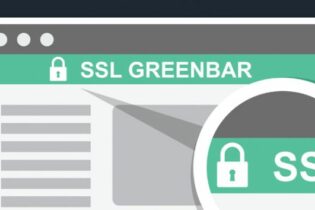
OV (Organization Validation) and EV (Extended Validation) certificates are SSL certs that business websites use to prove identity and secure customer data. OV says, “Hey, we’re a real company,” while EV goes a step further, saying, “We’re not just legit, but also extra secure.” It’s all about different levels of online trust and protection for your sensitive information.
Many business websites use entry-level Domain Validation certificates, and there’s nothing wrong with that. However, an OV or EV certificate could be a better solution.
This article covers the difference between OV and EV certificates so you can decide whether they’re suitable for your online project. But first, let’s see what an OV vs. EV certificate does regarding encryption and authentication.
Table of Contents
- What Is an OV SSL Certificate?
- What Is an EV SSL Certificate?
- What Is the Difference Between OV and EV Certificates?
What Is an OV SSL Certificate?
An OV SSL certificate is a digital certificate that provides a high level of authentication for your website, assuring visitors that your site is secure and trustworthy.
When you apply for an OV SSL cert, the issuing Certificate Authority (CA) checks your right to use a specific domain name plus additional organization information. They verify your business name, location, and legal existence. This process might seem rigorous, but it establishes your identity and protects customers.
OV certificates are a vital choice for e-commerce websites, startups, NGOs, and any online business required by law to prove its identity. But while OV SSL certificates significantly enhance your website’s credibility, they don’t offer the highest level of validation available. That’s where EV SSL certificates come into play.
What Is an EV SSL Certificate?
An EV SSL certificate is a premium validation option that gives your site the highest level of authentication. It verifies your organization’s identity, operational and physical presence, and the authority of the person requesting the certificate.
EV SSL certificates include your company’s official name in the certificate’s information field for everyone to see. Upon inspecting your cert, visitors know they’re dealing with a legitimate business operating in good faith.
An EV SSL certificate can boost customer confidence and lead to higher conversion rates, but most importantly, it’s a testament to your high-security standards.
EV certs may not be worth the investment for small to medium-sized businesses, but they are the preferred choice for large enterprises, Fortune 500 companies, and financial institutions. Consider them if you’re in the fintech, insurance, or e-commerce industries.
What Is the Difference Between OV and EV Certificates?
You may wonder what else sets Organization Validation vs. Extended Validation certificates apart. The differences lie in authentication processes, visual cues, business impact, validation timelines, and applicability to wildcard and multi-domain certificates.
Here’s an in-depth EV vs OV SSL comparison:
Authentication Process
The OV process involves verifying your organization’s identity and legal existence. It checks the business name, location (company’s physical address), and domain ownership.
On the other hand, the EV SSL verification is more thorough. It includes all steps in the OV certificate order but also requires an enrollment form, at least three years of operational existence, and a more detailed final verification call. As a result, EV authentication is stricter but more transparent and efficient.
Visual Cues
Initially, Extended Validation certificates stood out by displaying the company’s official name in a unique green address bar next to the URL. However, browsers have evolved and phased out this visual indicator.
Google Chrome went even further and removed the SSL padlock in one of its latest updates, citing that HTTPS is now the norm and doesn’t need a separate indicator anymore.
As a result, both OV and EV certificates now present users with a standard padlock or “view information” symbol. Clicking it reveals more details about the certificate, including the validation type. Although the EV green bar is gone, users can still find out who is behind the website.
Business Impact
So, how do OV or EV SSL certificates impact your business? It’s the level of trust they convey to your website visitors. Security-wise, they both offer the same encryption strength and browser compatibility.
Where EV certificates excel, that’s in the higher assurance provided by a certificate authority. A more complex vetting process enhances a company’s defense against phishing attacks and reduces the likelihood of users falling victim to fraudulent websites attempting to impersonate the company.
Validation Timelines
OV and EV certificates require a series of checks to authenticate a business. However, the time it takes to verify the applicant’s information varies. CAs issue OV SSL certificates in 1-2 business days, providing your information is accurate and up-to-date.
EV certificates can take between 1 and 7 business days to obtain. If the CA can’t validate your credentials via publicly available databases, you must provide additional paperwork, prolonging your wait.
Today, you can speed up the OV and EV SSL certificate validation if your organization has a LEI code. A LEI (Legal Entity Identifier) is a unique 20-character label that provides a standardized and globally recognized way to identify legal entities engaging in financial transactions.
Wildcard and Multi-Domain Certificates
Wildcard certificates secure unlimited subdomains of a single website, while Multi-Domain certificates secure multiple domain names under one SSL installation. Both types provide Organization Validation, but only multi-domain certs support Extended Validation.
Wildcard SSL certificates don’t support Extended Validation due to security considerations and resource challenges. Verifying limitless subdomains becomes logistically complex and time-consuming, compromising the stringent validation process inherent to EV certificates.
SSL Warranties
An SSL warranty protects your website’s users against data breaches due to a certificate miss-issuance. There’s a noticeable difference between OV and EV SSL certificates that you should consider for your website’s security.
OV certificates provide a lower warranty level, typically around $50,000. On the other hand, EV certificates offer generous warranties, often exceeding $1 million. This high warranty level reflects the extensive validation process EV SSL certificates undergo. It’s a strong signal of the superior trust and protection they offer.
Pricing Considerations
An Extended Validation certificate is more expensive than an OV one because of its thorough validation and better features. The price varies depending on the brand, SSL warranty, and how many domains the certificate secures.
The cheapest OV SSL certificate, Comodo InstantSSL, is just $37.33 per year if you get a multi-year subscription. Conversely, the most affordable EV certificate, Comodo PositiveSSL EV, costs $75.
Bottom Line
In essence, both OV and EV SSL certificates provide a high level of security. However, EV certificates offer enhanced confidence and authenticity due to stringent vetting procedures.
So, if you’re looking for a certificate that offers more reassurance to your website visitors about your business’s legitimacy, go for an EV. But, if cost and time are concerns, an OV certificate can serve you well.
Concluding our OV vs. EV certificate comparison, it’s worth mentioning that both options provide the same encryption strength.
As your online business grows or your needs change, you can upgrade from an OV to an EV certificate anytime, but the best period to do it is during the SSL renewal.
Save 10% on SSL Certificates when ordering today!
Fast issuance, strong encryption, 99.99% browser trust, dedicated support, and 25-day money-back guarantee. Coupon code: SAVE10


























